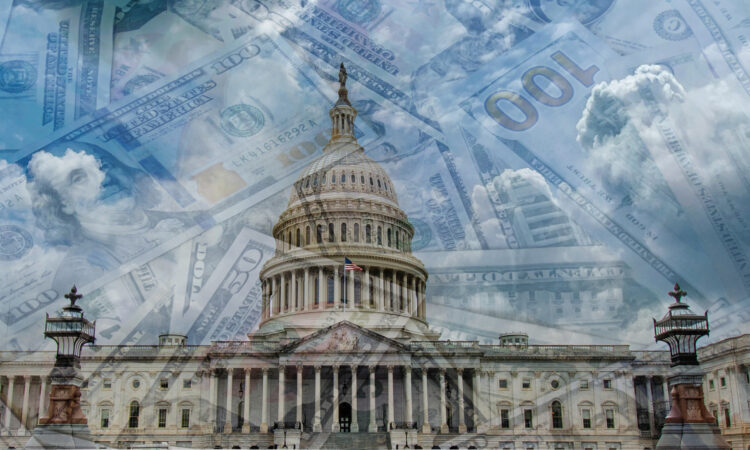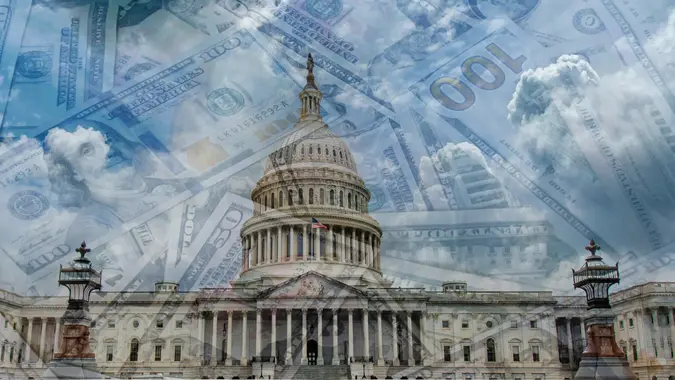

Douglas Rissing / Getty Images/iStockphoto
The U.S. has hit its debt ceiling, the Treasury Department announced on Thursday, Jan. 19. With no deal in sight to raise it, Treasury Secretary Janet Yellen notified Congress it would start its “extraordinary measures” today.
Debt Ceiling 2023: ‘Extraordinary Measures’ US Treasury Could Take To Avoid Default
Find: Get Your Credit Score On Track With These 3 Tips for Success
Learn: Here’s How Much Americans Have in Their Savings Accounts in 2023
In the Jan. 19 letter to House Speaker Kevin McCarthy, Yellen said that as part of these measures, the Department will suspend new investments in the Civil Service Retirement and Disability Fund (CSRDF) and the Postal Service Retiree Health Benefits Fund (PSRHBF) from today until June 5, 2023.
“By law, the CSRDF and the PSRHBF will be made whole once the debt limit is increased or suspended. Federal retirees and employees will be unaffected by these actions,” Yellen wrote on Jan. 19. “As I stated in my January 13 letter, the period of time that extraordinary measures may last is subject to considerable uncertainty, including the challenges of forecasting the payments and receipts of the U.S. Government months into the future. I respectfully urge Congress to act promptly to protect the full faith and credit of the United States.”
What Led Up to This Moment?
On Jan. 13, Yellen had warned Congress that the country would hit the debt ceiling on Jan. 19, but despite the urgency, it failed to reach a deal.
The debt limit was raised to approximately $31.381 trillion on Dec. 16, 2021, but a Republican-led Congress following the midterm elections is now looking for spending cuts in exchange for support in raising the debt ceiling, something most Democrats argue against.
Last week Yellen said, “failure to meet the government’s obligations would cause irreparable harm to the U.S. economy, the livelihoods of all Americans, and global financial stability.”
National Economic Council Director Brian Deese told CNN on Jan. 19 warned against “economic chaos” that could ensue if Congress failed to increase the limit.
“This is about economic stability versus economic chaos,” Deese told CNN, adding that it was Congress’ “basic, fundamental obligation.”
“Even just the specter that the United States might not honor its obligations does damage to the economy,” Deese added.
Meanwhile, on the Republican side, Rep. Andy Biggs (R-Ariz.) tweeted on Jan. 17: “We cannot raise the debt ceiling.
Democrats have carelessly spent our taxpayer money and devalued our currency. They’ve made their bed, so they must lie in it.”
What Does Raising the Debt Ceiling Do?
Raising the debt ceiling does not authorize new spending commitments, however. All it does is enable the government to finance existing legal obligations that congresses and presidents of both parties have made in the past, according to the Treasury.
In turn, “the federal government would have to at least temporarily default on many of its obligations, from Social Security payments and salaries for federal civilian employees and the military to veterans’ benefits, among others,” according to the Committee for a Responsible Federal Budget (CFRB).
Republicans are reportedly working on a “payment prioritization” proposal that would call on the government to make only the most critical federal payments, The Washington Post reported.
While details are still being worked out, this plan could trigger another set of issues, CNN explained.
“For instance, lawmakers would have to decide which to pay first – Social Security monthly payments to the tens of millions of senior citizens and Americans with disabilities, salaries of federal workers and the military or the interest on US debt to a multitude of investors, many of them foreign,” according to CNN.
More From GOBankingRates
Source link






